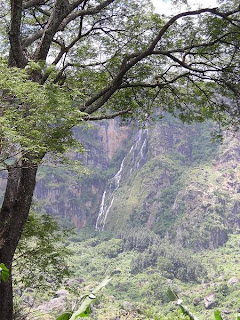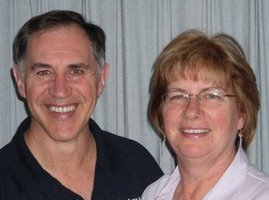Herbal Medicine
Vincent then took us up to his house, a little further up in the hills, and showed us around his wonderful garden.  He is also a herbalist and has such a wealth of knowledge about which plants can treat which illness. One tree, called the madina tree, can be used in many different ways. The seeds can be used to purify water, the pods can be crushed to add fibre to the diet, the leaves can be dug back into the soil to add nitrogen and also make a tea for stomach complaints. He grows lemon balm to reduce high blood pressure, other plants can be used to treat malaria, leaves can be rubbed on the skin to repel mosquitoes and some can even be used to soothe patients with mental illnesses. He encourages the villagers to grow these plants in their gardens also.
He is also a herbalist and has such a wealth of knowledge about which plants can treat which illness. One tree, called the madina tree, can be used in many different ways. The seeds can be used to purify water, the pods can be crushed to add fibre to the diet, the leaves can be dug back into the soil to add nitrogen and also make a tea for stomach complaints. He grows lemon balm to reduce high blood pressure, other plants can be used to treat malaria, leaves can be rubbed on the skin to repel mosquitoes and some can even be used to soothe patients with mental illnesses. He encourages the villagers to grow these plants in their gardens also.
Educating Women
His wife Grace has set up a café in the town and is training some people in basic catering skills. Any that show some aptitude they then help them to set up their own small business. She is also training the women in the villages how to use more fuel efficient stoves (provided by Jenga) so that they don’t have to gather so much firewood each day. Also she teaches them basic hygiene like washing hands and to boil the drinking water.
Goats
We drove up the hill (actually  further to see the Goat Breeding Project – quite a rugged trip! We saw the male breeding goats which they breed with the local ones to produce a higher milk production. The first female kid is then returned to be part of the breeding stock.
further to see the Goat Breeding Project – quite a rugged trip! We saw the male breeding goats which they breed with the local ones to produce a higher milk production. The first female kid is then returned to be part of the breeding stock.

Lots of little children came out to see us and enjoyed the antics as we tried to reverse the van out and back onto the road.
 The children were tiny – one boy was 4 but looked like a one year old in size!
The children were tiny – one boy was 4 but looked like a one year old in size!
Water
After much scraping and mucking around we headed “up up” to see the Water Project. Jenga has installed water tanks and guttering at many of the houses to collect fresh rainwater for the villagers to share.  Then they don’t have to walk as far to the village tap to collect water in their jerry cans and balance them on their heads as they walk back.
Then they don’t have to walk as far to the village tap to collect water in their jerry cans and balance them on their heads as they walk back.  We then headed to the source of the tap water. We parked the van and walked “a bit” to where the water was coming out of the ground.
We then headed to the source of the tap water. We parked the van and walked “a bit” to where the water was coming out of the ground.  We saw several spectacular waterfalls on the way. There was an original government project using gal iron pipes which had fallen into disrepair (maintenance is not a word in the Ugandan government vocab) so Jenga replaced them with plastic pipes. A rock wall had been built and the water is diverted into a settling tank. Water runs then by gravity to a storage tank before running into the pipes down to the taps.
We saw several spectacular waterfalls on the way. There was an original government project using gal iron pipes which had fallen into disrepair (maintenance is not a word in the Ugandan government vocab) so Jenga replaced them with plastic pipes. A rock wall had been built and the water is diverted into a settling tank. Water runs then by gravity to a storage tank before running into the pipes down to the taps.  It is not treated and contains high amounts of contaminants from animal and human waste further up the mountains. Jenga has trained a local committee to now look after it all.
It is not treated and contains high amounts of contaminants from animal and human waste further up the mountains. Jenga has trained a local committee to now look after it all.
It was a very interesting morning up in the beautiful Ugandan countryside.

No comments:
Post a Comment